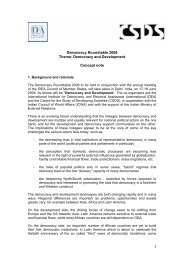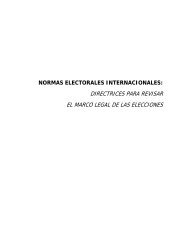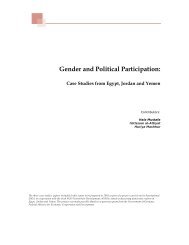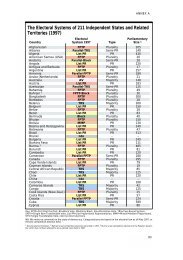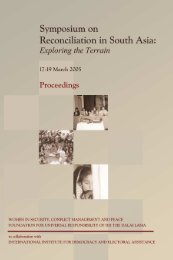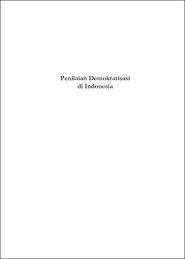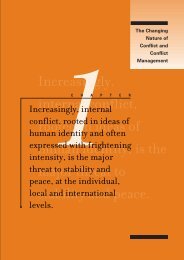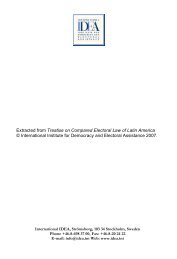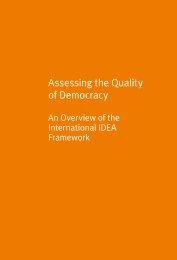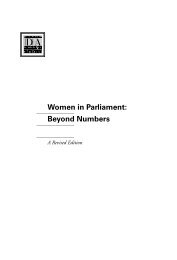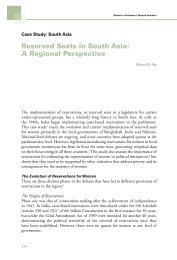The Role of State Constitutions in Protecting ... - International IDEA
The Role of State Constitutions in Protecting ... - International IDEA
The Role of State Constitutions in Protecting ... - International IDEA
You also want an ePaper? Increase the reach of your titles
YUMPU automatically turns print PDFs into web optimized ePapers that Google loves.
Basic guarantees<br />
<strong>The</strong> basic guarantees <strong>of</strong>fered by the constitution <strong>in</strong>clude:<br />
◆ Preamble to the constitution<br />
◆ Right to Equality<br />
◆ Right to Freedom<br />
◆ Right to religious freedom<br />
◆ Cultural and educational rights for the m<strong>in</strong>orities<br />
<strong>The</strong> secular objective <strong>of</strong> the <strong>State</strong> has been specifically expressed by <strong>in</strong>sert<strong>in</strong>g the<br />
word ‘secular’ <strong>in</strong> the Preamble by the Constitution (42nd Amendment) Act,<br />
1976. <strong>The</strong>re is no provision <strong>in</strong> the Constitution mak<strong>in</strong>g any religion the ‘established<br />
Church’ as some other <strong>Constitutions</strong> do. <strong>The</strong> provisions <strong>of</strong> the Indian<br />
Constitution for the protection <strong>of</strong> the m<strong>in</strong>orities are exhaustively enumerated <strong>in</strong><br />
Articles 25–30 and allied provisions <strong>of</strong> the Indian Constitution. <strong>The</strong> m<strong>in</strong>orities<br />
<strong>in</strong> consideration here are the religious and l<strong>in</strong>guistic m<strong>in</strong>orities <strong>in</strong> India. On the<br />
other hand, the liberty <strong>of</strong> ‘belief, faith and worship’ promised <strong>in</strong> the Preamble is<br />
implemented by <strong>in</strong>corporat<strong>in</strong>g the fundamental rights <strong>of</strong> all citizens relat<strong>in</strong>g to<br />
‘freedom <strong>of</strong> religion’ <strong>in</strong> Arts. 25–29, which guarantee to each <strong>in</strong>dividual freedom<br />
to pr<strong>of</strong>ess, practice and propagate religion, assure strict impartiality on the part <strong>of</strong><br />
the <strong>State</strong> and its <strong>in</strong>stitutions towards all religions. Though the provisions guarantee<strong>in</strong>g<br />
religious freedom to every <strong>in</strong>dividual cannot, strictly speak<strong>in</strong>g, be said to<br />
be specific safeguard <strong>in</strong> favor <strong>of</strong> the m<strong>in</strong>orities, they do protect the religious m<strong>in</strong>orities.<br />
Any section <strong>of</strong> the citizens <strong>of</strong> India hav<strong>in</strong>g a dist<strong>in</strong>ct language, script or culture <strong>of</strong><br />
its own shall have the fundamental right to conserve the same [Art. 29(1)]. This<br />
means that if there is a cultural m<strong>in</strong>ority which wants to preserve its own language<br />
and culture, the <strong>State</strong> would not by law impose upon it any other culture<br />
belong<strong>in</strong>g to the majority <strong>of</strong> the locality. This provision, thus, gives protection not<br />
only to religious m<strong>in</strong>orities but also to l<strong>in</strong>guistic m<strong>in</strong>orities. <strong>The</strong> promotion <strong>of</strong><br />
H<strong>in</strong>di as the national language or the <strong>in</strong>troduction <strong>of</strong> compulsory primary<br />
education cannot be used as a device to take away the l<strong>in</strong>guistic safeguard <strong>of</strong> a<br />
m<strong>in</strong>ority community as guaranteed by Arts. 29–30.<br />
No citizen shall be denied admission <strong>in</strong>to any educational <strong>in</strong>stitution ma<strong>in</strong>ta<strong>in</strong>ed<br />
by the <strong>State</strong> or receiv<strong>in</strong>g <strong>State</strong> aid, on grounds only <strong>of</strong> religion, race, caste,<br />
language or any <strong>of</strong> them [Art. 29 (2)]. This means that there shall be no<br />
discrim<strong>in</strong>ation aga<strong>in</strong>st any citizen on the grounds <strong>of</strong> religion, race, caste, or<br />
language, <strong>in</strong> the matter <strong>of</strong> admission <strong>in</strong>to educational <strong>in</strong>stitutions ma<strong>in</strong>ta<strong>in</strong>ed or<br />
aided by the <strong>State</strong>. It is a very wide provision <strong>in</strong>tended for the protection not only<br />
<strong>of</strong> religious m<strong>in</strong>orities but also <strong>of</strong> ‘local’ or l<strong>in</strong>guistic m<strong>in</strong>orities, and the provision<br />
is attracted as soon as the discrim<strong>in</strong>ation is immediately based only on the ground<br />
<strong>of</strong> religion, race, caste, language or any <strong>of</strong> them.<br />
24



